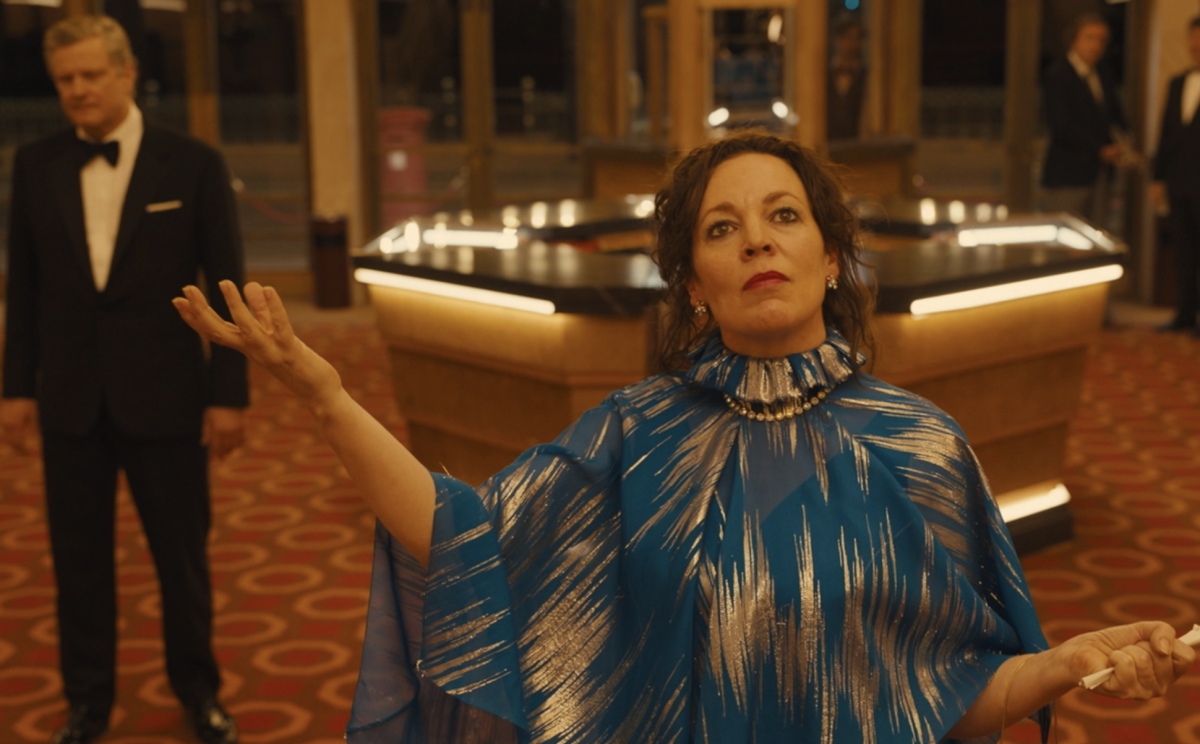
Olivia Colman is magnificent in Empire of Light. Photo: Supplied.
The year is 1981. We’re in Britain, and the film is set largely in a cinema called the Empire at Margate, a town on England’s southeast coast.
Empire of Light begins by introducing Hilary (Olivia Colman), duty manager at the cinema, whom we first get a real glimpse of when we see her at the doctor’s surgery, where her GP prescribes lithium for schizophrenia.
Her life is a mostly solitary one. She’s having an affair with the cinema’s married manager Donald Ellis (Colin Firth), but this seems little more than perfunctory.
Into the picture walks a new employee, a young black man, Stephen (Michael Ward). Hillary shows him around a beautiful Art Deco-designed building with two operational movie theatres and two more that were shut down years ago and are now inhabited mainly by pigeons.
On New Year’s Eve, when the pair are on the roof watching the town’s fireworks display, Hilary impulsively kisses Stephen.
From that point on, she begins a passionate affair with him, abandons Ellis, and decides to go off her lithium, and this is where everything begins to unravel.
This is the first time Sam Mendes (American Beauty, Road to Perdition, Skyfall) has both written and directed a movie.
“During the pandemic, I had a lot of time on my hands, as we all did, and I had a period of self-reflection. I had been thinking about my own upbringing, which was being brought up alone as an only child by a single mother, struggling to get by and struggling with mental health issues.”
But as he also says, he wanted to tell a parallel story about love and the time in which it was set.
In 1981, Margaret Thatcher was less than two years into her prime ministership, overseeing one of the most divisive periods in modern British politics.
There were often violent clashes between skinheads, mods, rockers, rude boys and more. The London suburb of Brixton erupted into rioting in April, mainly between black youths and the Metropolitan police. Violence became a way of life for many young people as the country plunged into recession.
Stephen is hassled by a group of skinheads and reveals to Hilary he has always been on the receiving end of racism no matter where he goes. This becomes a crucial element to the plot because he finds it harder and harder to continue with her without facing discrimination.
The cinema is given the gift of premiering the film, Chariots of Fire. It is a gala event and all the local dignitaries are in attendance.
The Master of Ceremonies is Donald Ellis. After his speech, Hilary, who has been away sick, takes to the stage, and it becomes abundantly clear her mental state has deteriorated.
Mendes is keen to chronicle Hilary’s battles, her love for Stephen and her search for some form of equanimity. He does this with the subtlety of a Turner, weaving the various storylines to make a complex but relatable whole.
Olivia Colman puts in the performance of a lifetime. She can go from a moment of love to rage in the blink of an eye and can then be so tender and vulnerable – the audience is so drawn to her brittleness that it is heartbreaking.
I’ve never seen Michael Ward before, but this performance was very impressive. Toby Jones, who plays Norman the projectionist, also has an extraordinarily beautiful small role.
Empire of Light is not a great film, but it is a very good one, and the entire piece is enthralling.
Three and a half out of five stars.
Empire of Light is showing around Australia (it opens in some regional centres on 29 April).
Original Article published by Marcus Kelson on Riotact.








